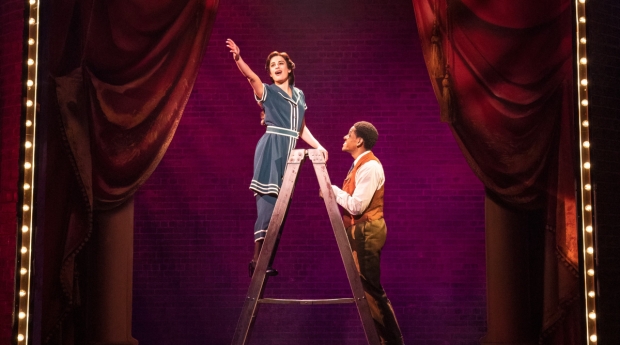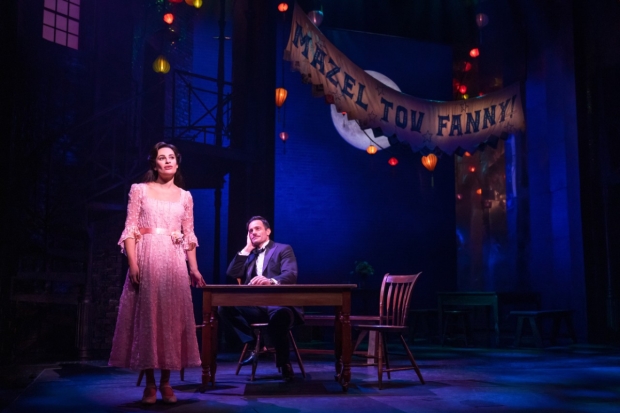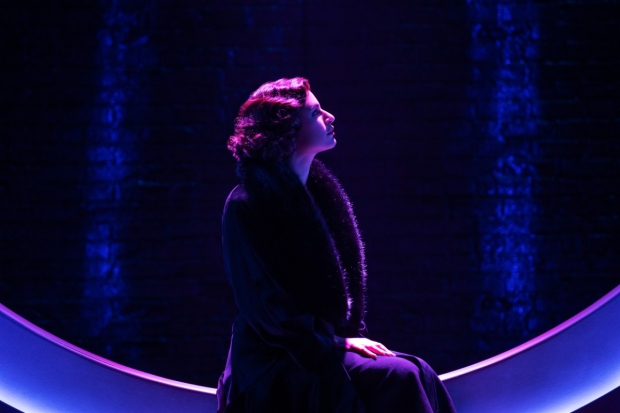Review: Lea Michele Sings New Life Into Funny Girl on Broadway
The casting drama surrounding Michael Mayer’s revival is finally put to bed as its new star comfortably settles into the August Wilson Theatre.

(© Matthew Murphy)
It's hard to think of anything novel to say about Lea Michele's undeniably excellent and already much-applauded turn as Funny Girl's new Fanny Brice. Especially when my procrastinating mind keeps toggling over to YouTube where bootleg recordings of Michele's performances pile up by the day. Yes, I know, it's a scourge on our industry and an insult to hardworking performers. But I just want to hear her sing "Cornet Man" one…or five more times.
Therein lies the intangible core of Michele's success in this role — the culmination of a long and public saga that has added a new chapter to Funny Girl's already dense mythology. Her voice is clear and powerful. Her acting has contour and texture. But not even those technical proficiencies explain the gravitational X factor that leaves one wanting to experience a performance over and over again. It's the X factor that makes a Fanny Brice.
Comparisons to Michele's predecessor Beanie Feldstein feel unnecessary to expound upon, so I'll leave the side-by-side analysis to others. What I will say is that the production's troubles are finally distinct from the troubles with its leading lady. Mayer's taste for broad humor still bogs down Fanny's biggest comedic moment in the Ziegfeld wedding number ("His Love Makes Me Beautiful"), and his Follies-esque framing device featuring ethereal echoes of Fanny's past only occasionally creates its intended effect (David Zinn's much griped-about set, which facilitates this time capsule motif, remains cramped — especially for Michele who has no problem filling the space with her presence).
The beats of the story itself, however, have never been clearer nor more finely punctuated with emotion and intention. "I'm the Greatest Star" bubbles over with youthful energy but carries reserves of tension that force us to take this little girl seriously (she promises it'll be our loss if we don't). Isobel Lennart's book (newly revised by Harvey Fierstein) has always struggled to find a proper balance between the story of Fanny as a hungry rising star and her ill-fated romance with the debonair Nick Arnstein (still performed impeccably by Ramin Karimloo).

(© Matthew Murphy)
But Michele's rendition of "People," aside from being gorgeously sung, bridges these two sides of the story and makes it the pivotal turning point that it should be. Fanny is a newly minted Ziegfeld star about to get everything she ever wanted, and the love of a beautiful man manages to turn her head when nothing else before ever could. It makes her Act 1 closer "Don't Rain on My Parade" all the more climactic, and the collapse that follows in Act 2 all the more poignant (her performance of "The Music That Makes Me Dance" is mature and lovely).
It certainly helps that there is genuine chemistry between Michele and Karimloo, each intrigued by the other's exotic unfamiliarity (their Act 2 duet, "Who Are You Now?," is breathtaking). But enough about the sob story. After all, the show is called Funny Girl, and people will want to know if Michele is in fact…funny. Her fabulous rapport with her onstage mama, played with proper heimish brass by Tovah Feldshuh, sets us in the right universe, with Fanny's Henry Street sensibilities firmly established in her performance affect. But her funniest moments are played opposite Karimloo (the flirty cat-and-mouse game in "You Are Woman, I Am Man" is delightful).
When left to her own devices, she is charming and mines her solo numbers for the right comedic opportunities, but Michele is decidedly an actor, not a clown. Aided by a much more tolerable Brooklyn accent (I promise, that will be my last comparison to Feldstein), her comedy feels most organic when her character is diffusing a moment that feels too fraught or personally exposing. And yet, fraught and exposing are the places Michele thrives. In her final reprise of "Don't Rain on My Parade," she goes, in moments, from a full sob to the brightest belt you've ever heard. That preternatural ability is not just the skill of an actor and singer. It's the control of a performer…and yes, a star.

(© Matthew Murphy)









